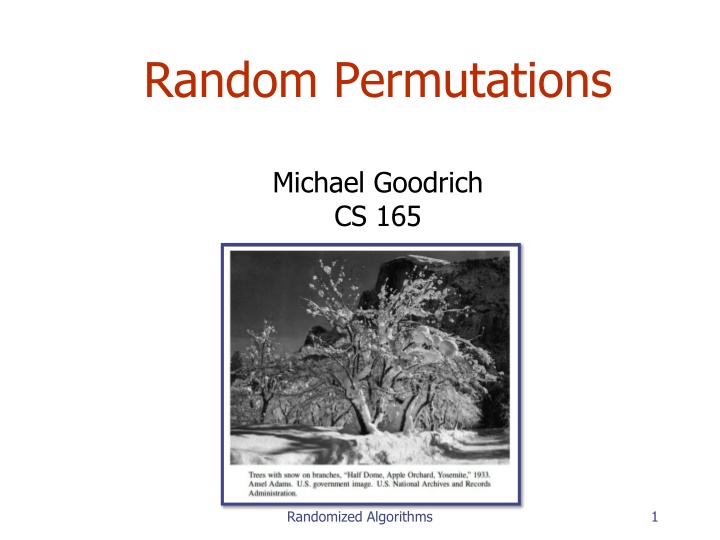
Randomized Algorithms for Generating Random Permutations
Explore the concept of random permutations in computer science, including random sort algorithms, Fisher-Yates shuffling, and analysis of permutation probabilities. Discover how randomized algorithms play a crucial role in various applications, such as card games and efficient algorithm design.
Download Presentation

Please find below an Image/Link to download the presentation.
The content on the website is provided AS IS for your information and personal use only. It may not be sold, licensed, or shared on other websites without obtaining consent from the author. If you encounter any issues during the download, it is possible that the publisher has removed the file from their server.
You are allowed to download the files provided on this website for personal or commercial use, subject to the condition that they are used lawfully. All files are the property of their respective owners.
The content on the website is provided AS IS for your information and personal use only. It may not be sold, licensed, or shared on other websites without obtaining consent from the author.
E N D
Presentation Transcript
Random Permutations Michael Goodrich CS 165 Randomized Algorithms 1
Generating Random Permutations The input to the random permutation problem is a list, X = (x1, x2, . . . , xn), of n elements, which could stand for playing cards or any other objects we want to randomly permute. The output is a reordering of the elements of X, done in a way so that all permutations of X are equally likely. We can use a function, random(k), which returns an integer in the range [0, k 1] chosen uniformly and independently at random. Randomized Algorithms 2
Applications: Simple Algorithms and Card Games A randomized algorithm is an algorithm whose behavior depends, in part, on the outcomes of random choices or the values of random bits. The main advantage of using randomization in algorithm design is that the results are often simple and efficient. In addition, there are some problems that need randomization for them to work effectively. For instance, consider the problem common in computer games involving playing cards that of randomly shuffling a deck of cards so that all possible orderings are equally likely. Randomized Algorithms 3
Algorithm 1: Random Sort This algorithm simply chooses a random number for each element in X and sorts the elements using these values as keys. Randomized Algorithms 4
Analysis of Random-Sort To see that every permutation is equally likely to be output by the random-sort method, note that each element, xi, in X has an equal probability, 1/n, of having its random ri value be the smallest. Thus, each element in X has equal probability of 1/n of being the first element in the permutation. Applying this reasoning recursively, implies that the permutation that is output has the following probability of being chosen: That is, each permutation is equally likely to be output. There is a small probability that this algorithm will fail, however, if the random values are not unique. Randomized Algorithms 5
Fisher-Yates Shuffling There is a different algorithm, known as the Fisher-Yates algorithm, which always succeeds. Randomized Algorithms 6
Analysis of Fisher-Yates This algorithm runs in O(n) time, by spending O(1) time per element, swapping it with an element earlier in the array (or itself). Notice that each element has an equal probability, of 1/n, of being chosen as the last element in the array X (including the element that starts out in that position). Applying this analysis recursively, we see that the output permutation has probability That is, each permutation is equally likely. Randomized Algorithms 7
